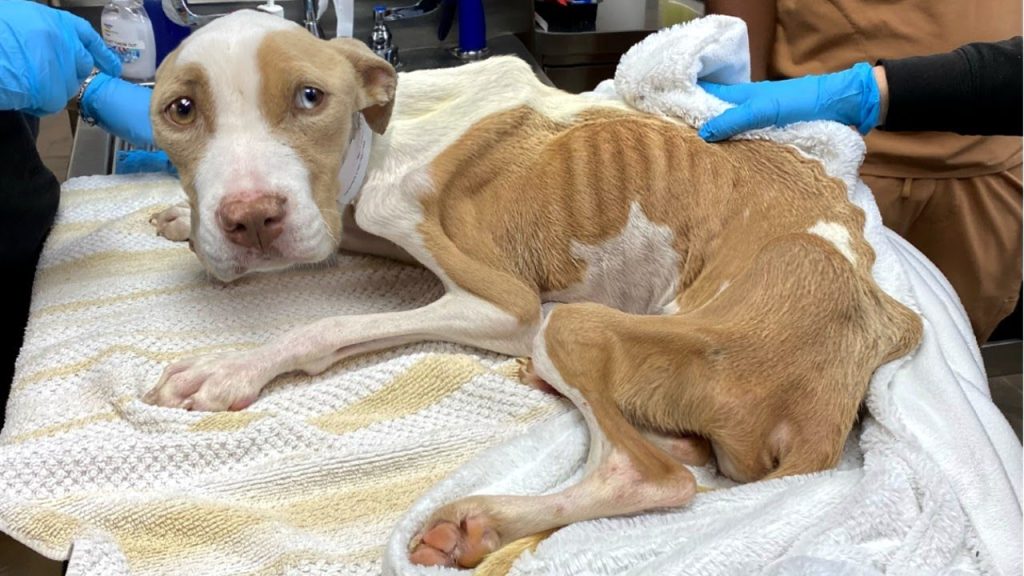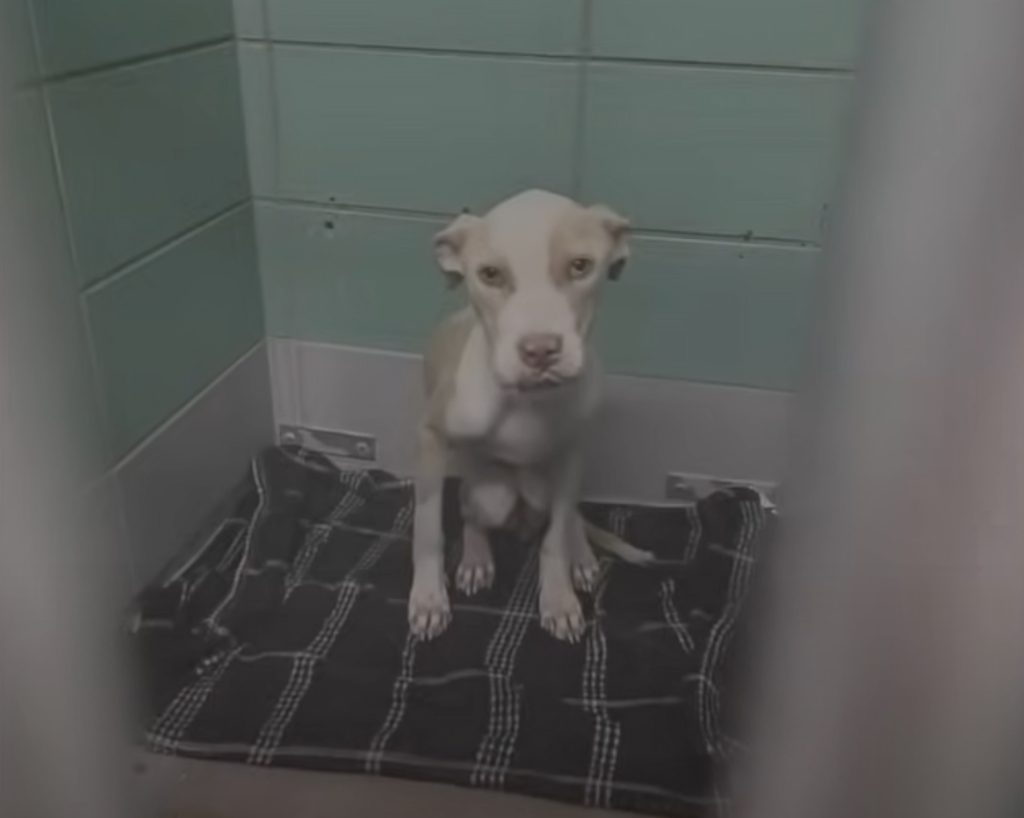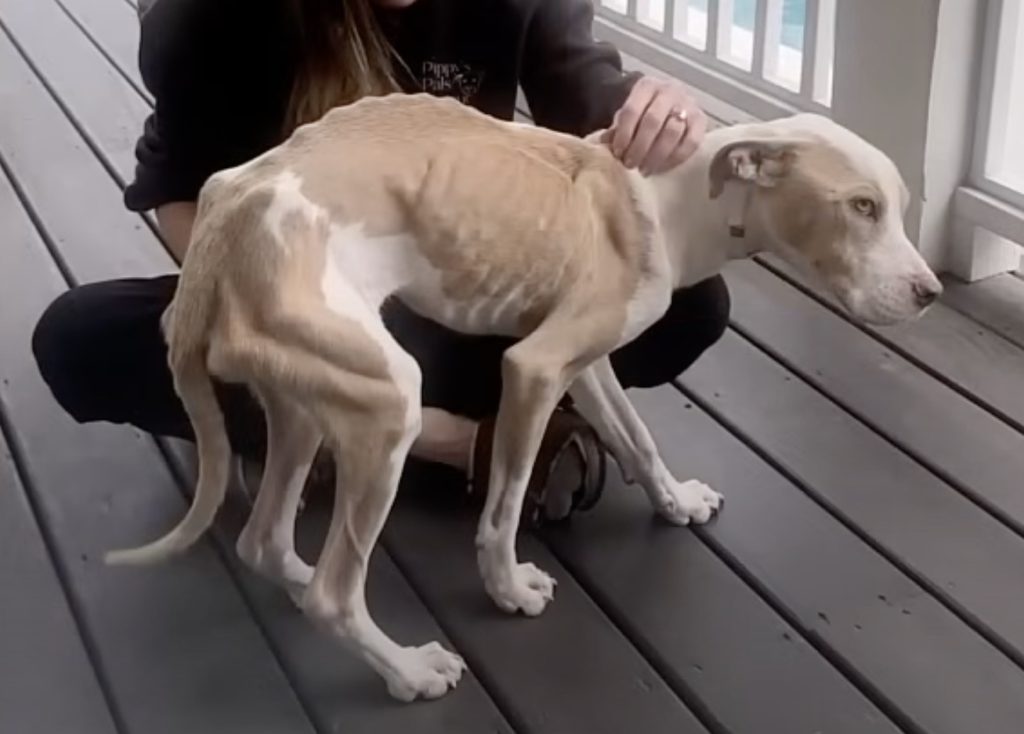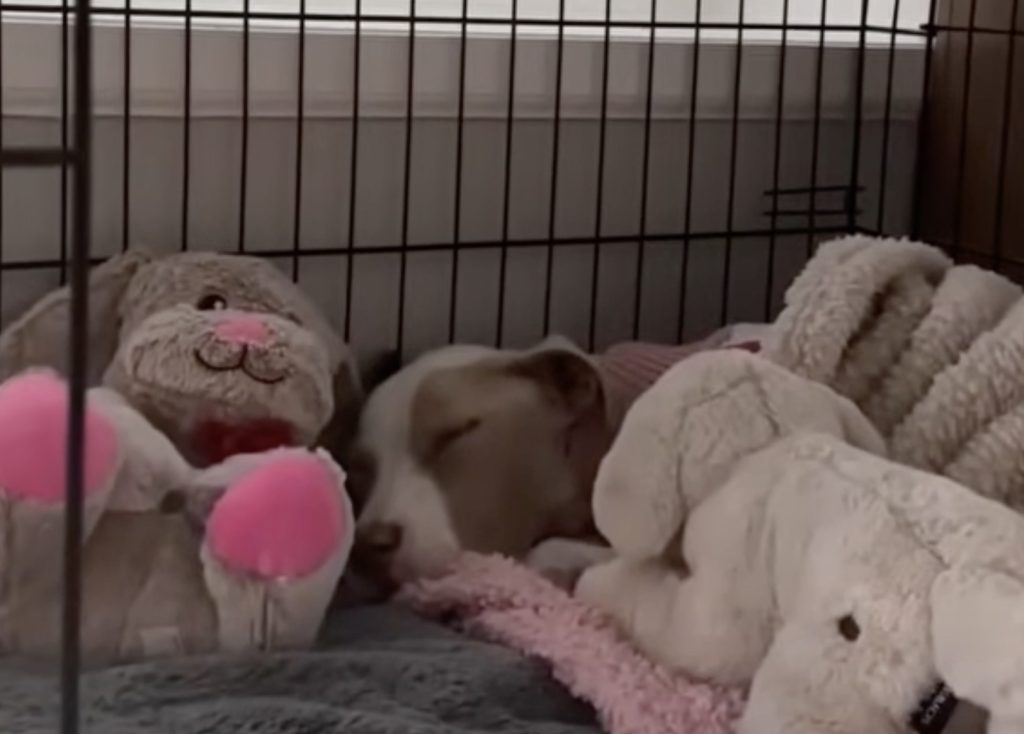When rescuers first saw Opal, the sight was enough to stop anyone in their tracks. She was huddled in the corner of a cold shelter cage, a small, frail body trembling with exhaustion. Her ribs showed through her skin, and her eyes—though weary and dim—still carried a quiet spark of hope. It was clear she had endured something far worse than just life on the streets. Opal’s condition spoke of long-term neglect, of being locked away, forgotten, and left to fade.

Then came the woman who changed everything. The moment she laid eyes on Opal, she felt an unexplainable pull—a deep, immediate knowing that she couldn’t walk away. Without hesitation, she signed the papers and took Opal home. She didn’t see a broken dog; she saw a soul desperate for warmth, touch, and love. That day marked the beginning of Opal’s second chance, a chance to experience kindness that had been denied to her for so long.
In her new home, Opal was introduced to soft blankets, gentle hands, and the comforting rhythm of family life. She quickly grew attached to her foster mom, following her everywhere she went, tail wagging weakly yet joyfully. Despite her frail frame, Opal’s spirit was incredibly sweet. She loved to nuzzle into her foster mom’s lap, pressing her face against her chest as if to say, “Thank you for seeing me.”
But her road to recovery was fragile and complex. The veterinarians warned that because Opal was so severely malnourished, her body could not handle a sudden return to normal feeding. Her system had adapted to starvation, and giving her too much too soon could actually be fatal. Her foster mom learned how to feed her tiny amounts, slowly and carefully, watching her every reaction, praying each meal would help her grow stronger rather than make her sick.
For a while, things looked promising. Opal began to fill out, her eyes brightened, and her tail wagged with more strength. She learned what a warm bath felt like, and how wonderful it was to curl up on a soft bed beside people who loved her. She discovered the joy of being kissed on the head and told she was a “good girl.” Every little milestone—her first full meal, her first nap on the couch, her first moment of pure relaxation—felt like a victory.
But the damage from her past was deep, hidden beneath her fur and gentle eyes. One morning, her foster mom noticed Opal wasn’t herself. She didn’t get up to greet her like usual. Her food bowl sat untouched, and her tail no longer wagged. Soon, her breathing slowed, her body grew weak, and her temperature began to drop. Panic set in. Her foster mom rushed her to the vet, clutching her fragile body close, whispering, “Hold on, baby. We’re not giving up.”
Over the next few days, Opal saw several veterinarians and specialists. They ran tests, gave fluids, and tried every possible treatment. Her foster mom refused to leave her side. She sat in the clinic for hours, gently stroking Opal’s fur, softly singing to her, doing anything to remind her that she was loved and safe. But as the results came in, it became painfully clear that the neglect Opal had suffered before rescue had caused irreversible damage. Her organs were too weak, her body too fragile to continue the fight.

When the news came, her foster mom broke down in tears. She had hoped for a miracle, but instead, she was faced with a truth that felt unbearable. Still, she promised Opal that she would not face her final moments alone. She took her home one last time, wrapped her in a soft blanket, and laid beside her on the floor. The house was quiet except for the faint sound of breathing—the woman’s steady and deep, Opal’s slow and shallow.
In those final hours, Opal rested her head on her foster mom’s arm, her eyes closing gently as if she finally felt safe enough to sleep. There were no cold cages, no hunger, no fear—only love. Her foster mom whispered words of comfort, thanking her for letting her be part of her life, even if just for a little while. “You were loved every second,” she said through tears. “You mattered. You were good. And you will never be forgotten.”
Opal passed away peacefully, surrounded by warmth and tenderness she had once been denied. Her story doesn’t end in despair—it ends with love. Though her time in this world was short, she left a mark on every heart that knew her. She reminded everyone that even the smallest act of kindness can transform a life, even if just for a fleeting moment.

For her foster mom, losing Opal was devastating, but she found comfort in knowing that Opal didn’t die scared or alone. She died knowing love. And that, she believed, was worth everything. “If I could go back,” she said later, “I would rescue her all over again. Even knowing the ending, I’d do it a thousand times more.”
Opal’s story is not just about heartbreak—it’s about grace. It’s about how love, no matter how late it arrives, still matters. It reminds us that rescue isn’t only about saving a life; sometimes, it’s about giving that life a peaceful, dignified ending wrapped in compassion.
Her journey is a powerful testament to the goodness still left in this world—to the people who look past scars and see souls, to those who understand that every animal deserves to be seen, held, and loved.

Opal’s short time in her foster home became a lifetime’s worth of love packed into just a few weeks. She was cherished. She was valued. And though her body couldn’t recover, her spirit was finally free.
In a world where cruelty too often overshadows kindness, stories like Opal’s remind us why compassion matters—because sometimes, even the smallest kindness can be the most extraordinary gift of all.





